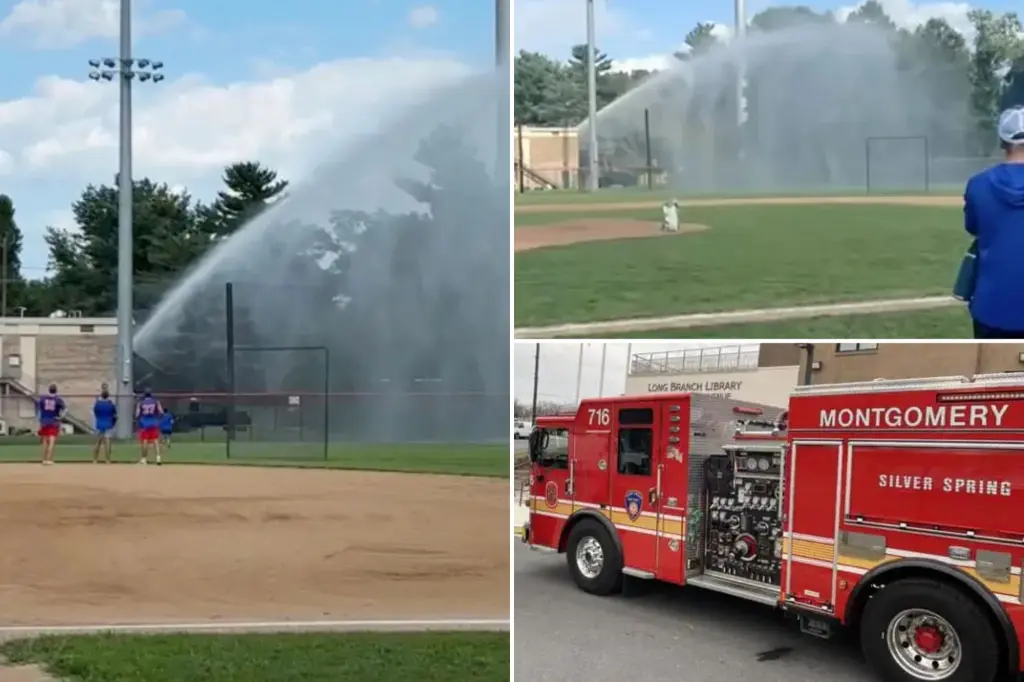Firemen Face Charges for Baseball Field Water Stunt: A Tale of Tension and Misplaced Retaliation
In a bizarre escalation of neighborhood tensions, two Maryland firefighters now face criminal charges after deliberately flooding a baseball field used by a collegiate team. Montgomery County Fire Captain Christopher Reilly and firefighter Alan Barnes each received three misdemeanor charges—two counts of malicious destruction of property and one count of disorderly conduct—following the incident that occurred in July. The Montgomery County Fire Rescue Service has taken immediate action, removing both men from operational duties and placing them on “non-public contact status” while an internal investigation proceeds alongside the criminal charges. This incident represents not just a momentary lapse in judgment, but the boiling point of what defense attorney Richard Finci described as an ongoing dispute between the firefighters and baseball players whose home runs and stray balls frequently landed on fire department property.
The incident unfolded at Montgomery Blair High School baseball field in Silver Spring, where the Cal Ripken Collegiate Baseball League team, the Silver Spring-Takoma Thunderbolts, regularly plays their games. According to reports, the flooding was triggered when a home run ball struck one of the firefighters’ pickup trucks parked in the firehouse lot adjacent to the field. In apparent retaliation, Barnes allegedly positioned the fire truck while Reilly operated the water hose, deliberately flooding the field. Captain Reilly later admitted to police that he allowed the water to flow for approximately one minute before shutting it off, but the damage was already done. The wooden-bat league team was forced to cancel their game, resulting in lost revenue and disruption to their season—all over what essentially amounted to a parking dispute and occasional stray baseballs.
What makes this case particularly striking is how it reveals the fragility of community relationships and how small irritations can compound over time until they trigger disproportionate responses. The firefighters, trained professionals dedicated to public safety and community service, allegedly used department equipment to exact revenge in a manner that not only damaged property but betrayed public trust. Dick O’Connor, founder and director of the Thunderbolts, highlighted the absurdity of the situation when he noted, “There are nine other leagues who play here, and we’re not the only ones that hit home runs.” This statement underscores the common nature of the supposed provocation—baseballs occasionally flying into the adjacent property is an inherent and predictable aspect of having a fire station located near a baseball field.
The consequences of this impulsive act extend well beyond the immediate damage to the field or the canceled game. For the firefighters involved, their careers now hang in the balance as they face both criminal prosecution and departmental discipline. The charges of malicious destruction of property and disorderly conduct could potentially result in fines or even jail time, while the internal investigation could lead to suspension or termination from positions that typically command respect and provide stable, meaningful careers. All this potential ruin stems from what was essentially a minute-long act of frustration—a stark reminder of how quickly momentary anger can translate into long-term consequences when it leads to property damage or other harmful acts.
From the perspective of the baseball team and the broader community, this incident represents a troubling breach of trust. Firefighters are emergency responders who citizens depend on during their most vulnerable moments—house fires, medical emergencies, and other disasters. The deliberate misuse of emergency equipment to cause property damage undermines the relationship between first responders and the public they serve. For the Thunderbolts, beyond the immediate financial loss from the canceled game, there’s the unsettling recognition that those entrusted with public safety would target them in such a petty and destructive manner. The incident raises legitimate questions about the relationship between various community institutions and how conflicts between them should be addressed through proper channels rather than retaliatory actions.
The Silver Spring firehouse incident serves as a cautionary tale about conflict resolution and professional responsibility. While the ongoing dispute between the fire station and the baseball team over home run balls was undoubtedly frustrating for both parties, the solution was never going to be found at the end of a fire hose. Proper channels existed—discussions between organizational leaders, potential modifications to the field or parking arrangements, or even municipal mediation—that could have addressed the legitimate concerns on both sides. Instead, the choice to respond with property destruction has transformed a minor neighborhood annoyance into criminal charges, professional consequences, community disruption, and a story that will likely follow all involved for years to come. As this case proceeds through the legal system, it stands as a reminder that even brief moments of retaliation can wash away years of good standing and community trust, much like the water that briefly but consequentially flooded the baseball diamond on that July day in Maryland.


